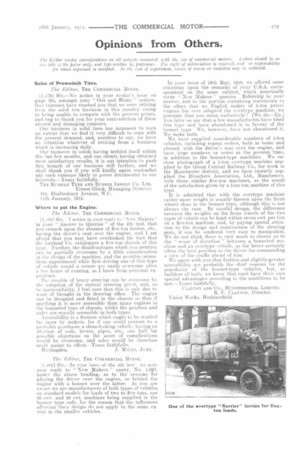Opinions from Others.
Page 19

If you've noticed an error in this article please click here to report it so we can fix it.
The E4fitor invites correspowience on all sal) f,cts connected with the use of commercial motors. Letters should be on vile side .4. the pal,er only, and type.written by preference. The right of abbreviation is reserved, and no responsibility for views expressed is accepted. In the case of experiences, names of towns or localities may be withheld.
Sales of Prowodnik Tires.
The Editor, THE COMMERCIAL MOTOR.
11,479] Sir,—We notice in your to-day's issue on page 31144, amongst your " Out and Home " notices, that rumours have reached you that we were retiring Irvin the solid tire business in this country owing to being unable to compete with the present prices, and beg to thank you for your contradiction of these absurd and damaging rumours.
Our business in solid tires has increased to such an extent that we find it very difficult to cope with the present demand, and, needless to say, we have no intention whatever of retiring from a business which is increasing daily.
Our turnover in solids having trebled itself within the !fist few months, and our clients haying obtained most satisfactory results, it is our intention to push this branch of our business still further, and we shall thank you if you will kindly again contradict any such rumours likely to prove detrimental to our interests.—Yours faithfully,
THE RUSSIAN TYRE AND RUBBER IMPORT CO. LTD. Ernest Gluck, Managing Director. le2, Shaftesbury Avenue, W.C.
11th January, 1912.
Where to put the Engine.
The Editor, THE COMMERCIAL MOTOR.
[1, Pie] Sir, • T notice in your reply to "New .Nlakers" in your " Answer to Queries " of the 4th inst.. that you remark upon the absence of five-ton lorries, etc., having the driver's seat over the engine, and 1 am afraid that you may have overlooked the fact. that the Leyland Co. catalogues a five-ton chassis of this type. Further, the disadvantages which you mention can be partially overcome by a little consideration in the design of the machine, and the peculiar.sensations experienced while first driving one of this type of vehicle round a corner are easily overcome after a. few hours of running, as I know from personal experience. The trouble of heavy steering can be overcome by the adoption of the central steering pivot, and, as to inaccessibility, 1 feel sure that this is only due to want of thought in the drawing office. The engine eon be designed and fitted in the chassis so that if anything it is more. accessible than many engines in the bonneted type of chassis, whilst the gearbox and axles are equally accessible in both types.
Accessibility is a feature which ought to be studied far more by makers, for if one could present to a probable purchaser a clean-looking vehicle, having an absence of rods, levers, pipes, etc., one half his possible objections on the score of complications would he overcome, and sales would be therefore much easier to effect.—Yours faithfully, slingden. J. MILNE, JUNR.
The Editor, THE COMMERCIAL MOTOR.
Sir,—In your issue of the 4th inst . we note your reply to " New Makers" query, No. 1,923, under the above heading, as to the reasons for placing the driver over the engine, or behind the engine with a. bonnet over the latter. As you are aware we are manufacturers of both types of vehicles as standard models for loads of two to five tons, our 20 cwt. and 30 cwt. machines being supplied in the bonnet type only, for the reason that the influences affecting their design do not apply to the same extent in the smaller vehicles.
In your issue of 19th May, 1910, we offered some criticisms upon the remarks of your U.S.A. correspondent on the same subject, which practically cover " New Makers " queries. Referring to your answer, and to the portion containing statements to the effect that no English maker of 5-ton petrol wagons has ever adopted the overtype machine, we presume that you mean exclusively ? [We do.—ED.J Von later on say that it few manufacturers have tried this type and have abandoned it in favour of the bonnet type. We, however, have not abandoned it. We make both.
We have supplied considerable numbers of 5-ton vehicles, including repeat orders, both at home and abroad, with the driver's seat over the engine, and have large numbers on order at the .present time, in addition to the bonnet-type machines. We enclose photograph of a 3-ton overtype machine supplied to the Great Central Railway Co., for work in the Manchester district, and we have recently supplied the Bleachers Association, Ltd., Manchester, with three similar five-ton machines, as the result of the satisfaction given by a four-ton machine of this type.
It is admitted that with the overtype machine rather more weight is usually thrown upon the front wheels than in the bonnet type, although this is not always the case. By careful design, the difference between the weights on the front wheels of the two types of vehicle can be kept within seven cwt.. per tire on a five-ton machine, and, by paying special attention to the design and construction of the steering gear, it can he rendered very easy to manipulate. We do not think there is very much to choose as to the " sense of direction " between a bonneted machine and an overtype vehicle, as the latter certainly oilers the best position to the driver For commanding a view of the t raffle ahead of him.
We agree with you that. fashion and slightly-greater accessibility are probably the chief reasons for the popularity of the bonnet-type vehicles, but, as builders of both, we know that each have their own special advantages according to the conditions to he met. —Yours faithfully,
CLAYTON AND CO., HUDDERSFIELD, LIMITED. R. F. CLAYTON, Director.
Union Works, Huddersfield.






















